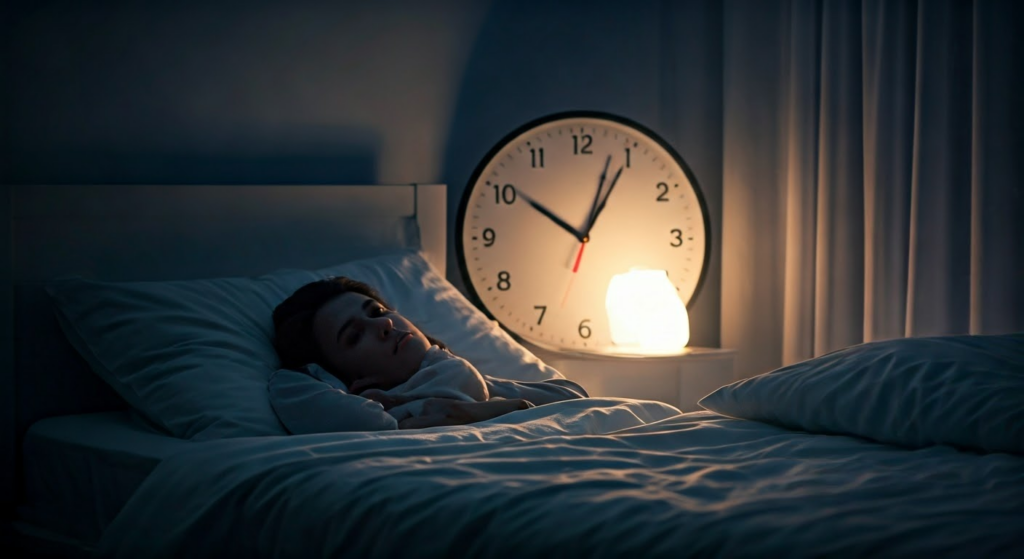
Key Highlights
- Insomnia is a common sleep disorder that can significantly impact daily life, affecting mood, energy levels, and overall health.
- Treatment options for insomnia include lifestyle changes, cognitive behavioral therapy for insomnia (CBT-I), and sleep medications.
- Prescription sleep aids, such as zolpidem (Ambien) and eszopiclone (Lunesta), can be effective for short-term relief but may have side effects and carry a risk of dependence.
- Over-the-counter (OTC) sleep aids, like diphenhydramine and melatonin, are readily available but may not be suitable for long-term use.
- It’s essential to consult with a healthcare provider to determine the underlying cause of your insomnia and find the most appropriate treatment plan.
Introduction
Restful sleep is very important for our health and feeling good. When we don’t get enough sleep, it can really affect our daily lives. Insomnia is the trouble many people face when they can’t fall asleep or stay asleep. This text looks at sleep medicine and different ways to treat insomnia. Setting good sleep habits is important, but also, prescription drugs and OTC sleep medications can help with short-term relief.
Understanding Insomnia and Its Impact

Feeling unable to sleep every now and then is something many people go through. But if trouble sleeping happens a lot and starts to disrupt daily life, it could mean that you have insomnia. This sleep issue can show itself as problems with falling asleep, staying asleep, or waking up too early. This leaves people feeling tired and foggy.
Insomnia doesn’t only ruin our nights. It also affects how we feel during the day. It can change our mood, drain our energy, reduce our focus, and harm our health. It’s important to notice the signs and understand what causes insomnia. Doing so will help you find the right treatment and take back your good nights of sleep.
The Basics of Insomnia
Chronic insomnia happens when you have trouble sleeping for at least three nights a week for three months or more. This can happen for many reasons like stress, anxiety, medical issues, bad sleep habits, or other sleep disorders. It’s important to know that insomnia is usually a sign of something else, not a separate problem.
Cognitive behavioral therapy for insomnia (CBT-I) is a very good way to treat this. It looks at the thoughts and actions that cause sleep problems. Techniques used in CBT-I include sleep restriction, controlling your sleep environment, and relaxation exercises to help with sleep quality.
To deal with chronic insomnia, you might need to change some habits, use CBT-I, and sometimes take sleep medications. It’s a good idea to talk to a healthcare provider. They can help find the cause of your sleep issues and make a plan that’s right for you.
How Insomnia Affects Daily Life
The effects of lack of sleep go beyond just the bedroom. When someone does not get enough sleep, they may feel tired and slow. It can be hard to focus on tasks, and they may feel moody or irritated. Activities that were once enjoyable can start to feel too much, leading to less productivity and a poorer quality of life.
The impact of insomnia on thinking is especially concerning. Problems with concentration, memory, and decision-making can happen without enough sleep. This can affect school or work performance and can also hurt relationships with others.
It is very important to focus on sleep quality to stay healthy and happy. Getting help for insomnia is not a sign of weakness. Instead, it is a smart choice to help you get back your energy, focus, and enjoyment of life.
Evaluating Prescription Sleep Medications
When changes to your lifestyle and therapy are not enough to help with insomnia, prescription sleep medications might help you sleep better. These medications are given out by healthcare professionals who closely monitor their use. They can help you sleep for a short time and can make it easier for you to develop healthier sleep habits.
But, using prescription sleep aids needs careful thought about possible side effects, risks, and how they may work over time. You should think about the benefits and the drawbacks. It’s important to make informed choices with your doctor about the best option for you.
The Role of Prescription Drugs in Treating Insomnia
Prescription sleep aids help people fall asleep or stay asleep. They can provide relief for those who have trouble sleeping due to insomnia. These medications work by changing how certain chemicals in the brain act, which helps you feel relaxed and sleepy. Still, it’s important to think about them as part of a complete treatment plan for insomnia.
Although prescription sleep aids can help in the short term, they aren’t meant for long-term use. This is because they can have potential side effects, cause dependence, and may become less effective over time. Always follow the drug administration guidelines and suggested dosages to reduce the chances of side effects.
Before starting any prescription sleep medications, it is essential to talk with your healthcare provider. Share your medical history, any current medications, and any worries you might have.
Key Types of Prescription Sleep Aids
Prescription sleep medications encompass several classes, each targeting different aspects of sleep regulation. Among these, benzodiazepine receptor agonists, commonly known as “Z-drugs,” are widely prescribed. Zolpidem tartrate (Ambien), eszopiclone (Lunesta), and zaleplon (Sonata) fall into this category, enhancing the effects of a neurotransmitter called GABA to slow down brain activity.
Another class, orexin receptor antagonists, includes medications like suvorexant (Belsomra) and lemborexant (Dayvigo). These newer sleep medications work by blocking the action of orexin, a neurochemical that promotes wakefulness. Understanding the mechanisms and potential side effects of each type is vital in making informed choices.
| Medication Type | Examples | Mechanism of Action | Potential Side Effects |
|---|---|---|---|
| Benzodiazepine Receptor Agonists (“Z-drugs”) | Zolpidem (Ambien), eszopiclone (Lunesta), zaleplon (Sonata) | Enhance GABA activity to slow down brain activity | Drowsiness, dizziness, headache, dependence |
| Orexin Receptor Antagonists | Suvorexant (Belsomra), lemborexant (Dayvigo) | Block orexin, a neurochemical that promotes wakefulness | Drowsiness, dizziness, headache, abnormal dreams |
| Melatonin Receptor Agonists | Ramelteon (Rozerem) | Mimic the effects of melatonin, a natural sleep-regulating hormone | Dizziness, nausea, fatigue |
| Tricyclic Antidepressants | Doxepin (Silenor) | Affect neurotransmitters in the brain to promote sleep | Dry mouth, constipation, dizziness, urinary retention |
Highlighting Over-the-Counter (OTC) Options
Many people try to find help with sleep problems through over-the-counter (OTC) options. These options can include herbal supplements and regular antihistamines. Even though they are easy to get, you need to know about possible side effects and how they might interact with other medicines. It’s a good idea to talk to a healthcare provider before starting any new sleep aid. This step can help ensure safety and effectiveness in dealing with insomnia. Keep in mind, what works for one person may not work for another because of different health conditions and metabolism. Always put your well-being first when thinking about OTC sleep medications.
Common OTC Sleep Aids and Their Effectiveness
Navigating the world of OTC sleep aids can be confusing. There are many choices that promise a good night’s sleep. One common option is diphenhydramine, found in products like Benadryl and Unisom SleepGels. It works mainly as an antihistamine, but it can cause drowsiness. That’s why it’s often used in sleep aids.
Another popular OTC choice is melatonin. This is a hormone that your body makes to help control sleep patterns. Melatonin supplements are sold as a natural sleep aid. They try to help balance your sleep cycle. However, some people question how effective melatonin is for treating insomnia, and results can be different for each person.
It is also important to know that the FDA’s control over OTC sleep aids is different from that of prescription drugs. Generally, these OTC options are considered safe for short-term use. However, they may have side effects or interact with other drugs.
Natural Supplements for Insomnia Relief
For people looking for options beyond regular sleep medicines, natural sleep aids can be a softer choice. Melatonin is a common option. It is known for its potential to help reset sleep cycles. Still, it’s important to know that melatonin can have side effects. These may include feeling sleepy during the day, headaches, and dizziness.
Besides melatonin, there are other natural remedies that can help with relaxation and improving sleep quality. Valerian root, chamomile tea, and lavender essential oil are known for their calming effects. While these are usually safe if used correctly, it’s a good idea to talk to your doctor before adding any natural supplements to your sleep routine.
Keep in mind that just because something is natural, it does not always mean it is safe or works well. The effectiveness of natural sleep aids can vary a lot, and there is often little scientific proof to support their use.
Safety and Side Effects of Sleep Drugs

While medications, both prescription and over-the-counter (OTC), can help with insomnia, it is important to use them carefully. Sleep medications can have side effects, which can be mild for some and severe for others.
It’s very important to talk openly with your healthcare provider. Sharing your medical history, any health problems, and medications you are currently taking can help reduce the risk of harmful side effects.
Understanding the Risks of Sleep Medications
Prescription sleep medications can lead to more side effects and higher chances of dependence than over-the-counter (OTC) ones. You might experience drowsiness, dizziness, or trouble thinking. Some medications might even cause complex behaviors like sleepwalking, sleep-eating, or sleep-driving, which can be dangerous.
If you suddenly stop taking certain sleep medications, especially benzodiazepines or “Z-drugs,” you can face withdrawal symptoms. These may include anxiety, trouble sleeping, shaking, or even seizures in serious cases. It’s very important to talk to a doctor before stopping these medications. A safe way to taper off is essential.
When dealing with the risks of sleep medications, good communication with your doctor is key. Knowing about the potential side effects, withdrawal symptoms, and long-term outcomes helps you make better choices for your sleep health.
Tips for Safe Use of Sleep Aids
Using sleep aids safely, whether they are prescription or over-the-counter (OTC), is important to follow certain guidelines. First, always stick to the dosage that your healthcare provider gives you or what’s on the medication’s label. Taking more than what is advised can raise the chances of side effects and other problems.
Second, do not mix sleep medications with other things that make you sleepy, like alcohol, opioids, or some allergy medicines. This mix can cause serious issues like trouble breathing, which can be very risky.
Lastly, keep talking with your healthcare provider. Share any concerns, side effects, or changes in how you sleep. Regular check-ups can help keep track of your progress and make sure that the medication is working well and safe for you.
When to Consult a Healthcare Provider
Occasional sleep troubles are common, but ongoing issues may need help from a professional. If you have trouble falling asleep or staying asleep several times a week, and it affects your daily life and feelings, you should talk to a healthcare professional.
Don’t wait to get help. Fixing sleep problems early can stop them from becoming bigger health issues. Taking care of your sleep is important for staying healthy in body, mind, and emotions.
Recognizing Signs It’s Time to Seek Help
It is important to notice the signs that mean your sleep problems need professional help. This can stop insomnia from getting worse and help reduce health risks. If you struggle to fall asleep or stay asleep for three nights a week for three months or more, it’s time to get help.
You should pay attention if you feel very sleepy during the day, are often tired, feel irritable, have trouble focusing, or notice changes in your mood. These are all signs that your lack of sleep is hurting your daily life. If you are using sleep aids a lot, have withdrawal symptoms when trying to stop, or see a drop in your work or personal life, it is very important to talk to a healthcare provider.
Remember, asking for help is not a sign of weakness. It is a smart move to get back your sleep and improve your well-being.
What to Expect During the Consultation
During a visit for sleep issues, your healthcare provider will ask you many questions about your sleep. They will want to know about your sleep patterns and how long you have had these sleep problems. They might ask about any medications or supplements you take and your daily habits. They may also check for any medical or mental health issues that could be causing your insomnia.
A physical exam might be done to rule out any medical reasons for your sleep problems. Your healthcare provider may suggest a sleep study, known as polysomnography. This study looks at your sleep stages, breathing patterns, and other body functions while you sleep.
After their evaluation, your healthcare provider will create a treatment plan just for you. This plan might include some changes to your lifestyle, cognitive behavioral therapy for insomnia (CBT-I), and maybe some sleep medications that could be prescription or over-the-counter.
Conclusion
In conclusion, it is important to understand how insomnia affects your daily life. If you choose prescription sleep medications, over-the-counter aids, or natural supplements, safety should come first. Always consult a healthcare provider if you have ongoing sleep problems. Your health is very important, and getting expert help can give you the care you need. Good sleep plays a big role in your health and your quality of life. So, take action to address your insomnia for better and more refreshing sleep.
Frequently Asked Questions
What Is the Most Effective Sleep Medication for Insomnia?
The best sleep medication for insomnia can differ from person to person. It’s important to decide which one is right for you by talking to a healthcare professional. Treatment usually takes a personal approach that considers the possible benefits and risks.
https://www.ncbi.nlm.nih.gov/pmc/articles/PMC4890308
https://www.ncbi.nlm.nih.gov/pmc/articles/PMC2690563

